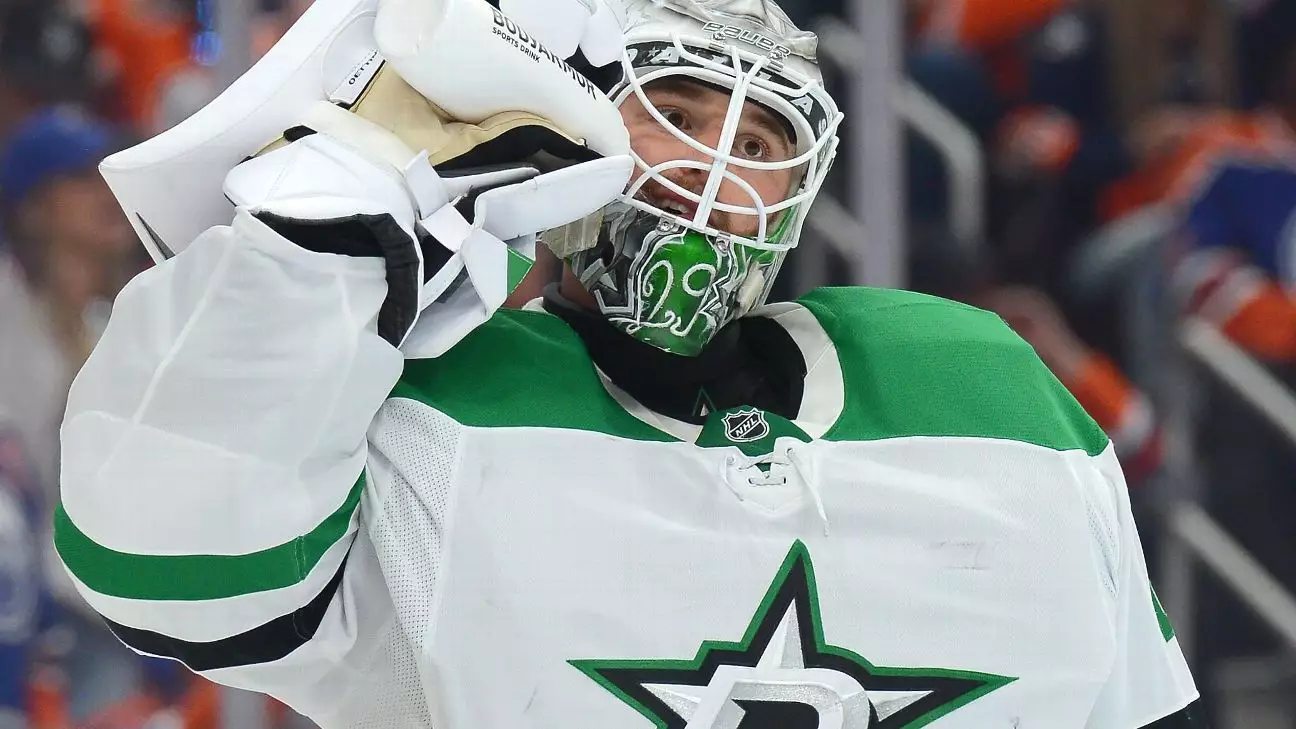Frisco, Texas, witnessed a pivotal moment in the career of young Dallas Stars goaltender, Jake Oettinger, during the critical Game 5 of the Western Conference finals. Only 7 minutes and 9 seconds into the contest, he was unexpectedly pulled after conceding two quick goals on the Oilers’ first two shots. This decision not only raised eyebrows among fans and analysts alike, but it also revealed the psychological burdens that young athletes face in high-stakes environments. Oettinger’s initial feelings of surprise and embarrassment, as he spoke candidly about the experience, underscore the gravity of a moment that, for many, could spell the end of their confidence.
The fact that Oettinger was replaced by Casey DeSmith just moments after the second goal was indicative of the pressure mounting on the team’s back end. Coach Peter DeBoer, tasked with protecting his squad’s championship aspirations, made a swift move that he viewed as necessary for survival. “There’s one motive,” he stated poignantly, emphasizing the need to push for a Game 6. This choice, fraught with risk, ultimately led to a loss; however, the underlying intention was for preservation — a gamble on Oettinger’s future performance that continued to be scrutinized long after the game’s conclusion.
Reflection and Growth
In a mature response, Oettinger reflected on his performance rather than placing blame elsewhere. “If I make one or two of those saves, then I’m still playing,” he observed thoughtfully. With only 503 shots faced throughout an exhausting postseason and a formidable save percentage, there is a strong case to be made for Oettinger’s overall talent and ability to bounce back. This advanced perspective on his shortcomings speaks to a healthier coping mechanism, allowing the young goaltender to transform failed moments into opportunities for development. He noted, “How can I get better from that?” Such a sentiment shows the mindset of a player determined not to dwell on past errors, but to view each setback as a stepping stone for future improvement.
Oettinger recognizes that learning from misery is a critical component of not only becoming a better athlete but also growing as a person. This maturity sets him apart from many young athletes who may wallow in self-doubt. Instead of letting this setback define him, he plans to channel it as a catalyst for improvement in his game, reinforcing the importance of resilience, a trait that is often underappreciated in professional sports.
The Weight of Expectations and Team Dynamics
The frustration felt within the Stars organization after another Western Conference finals defeat cannot be understated. For the third consecutive season, the team was eliminated in the playoffs at this stage, having also suffered the same fate at the hands of the Oilers the previous year. With history repeating itself, the narrative surrounding the Stars is shifting. It’s not merely about winning; it’s about overcoming the mental hurdles that come from consecutive losses at critical junctures.
DeBoer acknowledged the precarious nature of not just Oettinger’s performance but the team as a whole, highlighting that the Stars “looked tentative” trailing by two goals. His acknowledgment of Oettinger’s physical fatigue, despite the goaltender’s assertion of feeling great, adds a layer of complexity to the psychological landscape faced by athletes performing under pressure. This dichotomy underscores the often-ignored conversation about mental health in sports, where the expectation to perform maximally can lead to adverse effects that manifest long after the games end.
Building Forward with Optimism
As both players and coaching staff grapple with the end of a grueling season, it’s crucial to consider what lies ahead rather than wallowing in the past. Oettinger’s assertion that, “If I go out there next year and I’m the best goalie in the world, it doesn’t matter,” introduces a refreshing perspective focused on self-improvement over external validation. This embodies a spirit of optimism that could serve as a pivotal motivational tool for both himself and his teammates as they look toward the future.
The relationship between Oettinger and DeBoer, though tested, harbors potential for growth as well. Open dialogue and mutual respect can help transform this setback into a valuable chapter in their respective journeys. The resilience shown by Oettinger, supported by his understanding of the pressures of the sport, hints at a promising trajectory ahead. Smart decisions, open communication, and a commitment to learning from adversity will be essential as the Stars prepare to tackle their next challenges in the league, hoping to turn disappointment into triumph in future seasons.

